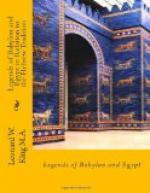“As for my human
race, from (or in) its destruction will I
cause it to be (. .
.), For Nintu my creatures (. . .) will
I (. . .).
The people will I cause to . . . in their settlements,
Cities . . . shall (man)
build, in there protection will I
cause him to rest,
That he may lay the brick of our houses in a clean spot,
That in a clean spot he may establish our . . . !”
In the reason here given for man’s creation, or for his rescue from the Flood, we have an interesting parallel to the Sixth Tablet of the Semitic-Babylonian Creation Series. At the opening of that tablet Marduk, in response to “the word of the gods”, is urged by his heart to devise a cunning plan which he imparts to Ea, namely the creation of man from his own divine blood and from bone which he will fashion. And the reason he gives for his proposal is precisely that which, as we have seen, prompted the Sumerian deity to create or preserve the human race. For Marduk continues:
“I will create man who shall inhabit (. . .),
That the service of
the gods may be established and that
their shrines may be
built."(1)
(1) See The Seven Tablets of Creation, Vol. I, pp. 86 ff.
We shall see later, from the remainder of Marduk’s speech, that the Semitic Version has been elaborated at this point in order to reconcile it with other ingredients in its narrative, which were entirely absent from the simpler Sumerian tradition. It will suffice here to note that, in both, the reason given for man’s existence is the same, namely, that the gods themselves may have worshippers.(1) The conception is in full agreement with early Sumerian thought, and reflects the theocratic constitution of the earliest Sumerian communities. The idea was naturally not repugnant to the Semites, and it need not surprise us to find the very words of the principal Sumerian Creator put into the mouth of Marduk, the city-god of Babylon.
(1) It may be added
that this is also the reason given for
man’s creation
in the introduction to a text which
celebrates the founding
or rebuilding of a temple.
The deity’s speech perhaps comes to an end with the declaration of his purpose in creating mankind or in sanctioning their survival of the Deluge; and the following three lines appear to relate his establishment of the divine laws in accordance with which his intention was carried out. The passage includes a refrain, which is repeated in the Second Column:
The sublime decrees he made perfect for it.




